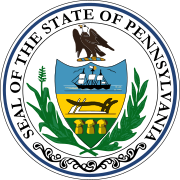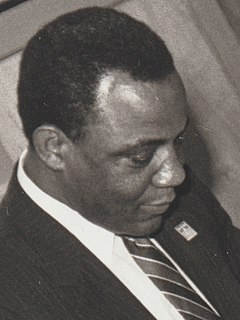Philadelphia mayoral election
| |||||||||||||||||
| |||||||||||||||||
The 1852 Philadelphia mayoral election saw the reelection of Charles Gilpin to a third consecutive term. [1]
| |||||||||||||||||
| |||||||||||||||||
| Elections in Pennsylvania |
|---|
 |
The 1852 Philadelphia mayoral election saw the reelection of Charles Gilpin to a third consecutive term. [1]
Beginning in 1839, the city operated under a mixed electoral system. Citizens voted for mayor in a general election. If a candidate receive a majority of the vote, they would be elected mayor. However, if no candidate received a majority, the City Council would select a mayor from the top-two finishers. [1]
| Party | Candidate | Votes | % | |
|---|---|---|---|---|
| Whig | Charles Gilpin (incumbent) | 8,792 | 64.99% | |
| Independent | William Badger | 4,328 | 31.99% | |
| Independent | John S. Warner | 408 | 3.02% | |
| Total votes | 13,528 | |||

Philadelphia's municipal election held on November 6, 1951, was the first under the city's new charter, which had been approved by the voters in April, and the first Democratic victory in the city in more than a half-century. The positions contested were those of mayor and district attorney, and all seventeen city council seats. There was also a referendum on whether to consolidate the city and county governments. Citywide, the Democrats took majorities of over 100,000 votes, breaking a 67-year Republican hold on city government. Joseph S. Clark Jr. and Richardson Dilworth, two of the main movers for the charter reform, were elected mayor and district attorney, respectively. Led by local party chairman James A. Finnegan, the Democrats also took fourteen of seventeen city council seats, and all of the citywide offices on the ballot. A referendum on city-county consolidation passed by a wide margin. The election marked the beginning of Democratic dominance of Philadelphia city politics, which continues today.

Philadelphia's municipal election of November 8, 1955, involved contests for mayor, district attorney, all seventeen city council seats, among other offices. Citywide, the Democrats took majorities of over 130,000 votes, continuing their success from the elections four years earlier. Richardson Dilworth, who had been elected district attorney in 1951, was elected mayor. Victor H. Blanc, a city councilman, was elected district attorney. The Democrats also kept fourteen of seventeen city council seats, losing one district seat while gaining another, and kept control of the other citywide offices. The election represented a further consolidation of control by the Democrats after their citywide victories of four years earlier.

Philadelphia's municipal election of November 7, 1961, involved the election of the district attorney, city controller, and several judgeships. Democrats swept all of the city races but saw their vote totals much reduced from those of four years earlier, owing to a growing graft scandal in city government. District Attorney James C. Crumlish, Jr. and City Controller Alexander Hemphill, both incumbents, were returned to office. Several ballot questions were also approved, including one permitting limited sales of alcohol on Sundays.

Philadelphia's municipal election of November 5, 1963, involved contests for mayor, all seventeen city council seats, and several other executive and judicial offices. The Democrats lost vote share citywide and the Republicans gained one seat in City Council, but the Democratic acting mayor, James Hugh Joseph Tate, was elected to a full term and his party maintained their hold on the city government. The election was the first decline in the Democrats' share of the vote since they took control of the city government in the 1951 elections, and showed the growing tension between the reformers and ward bosses within their party.

The 1983 Philadelphia mayoral election saw the election of Wilson Goode.

The 1839 Philadelphia mayoral election saw John Swift return to office for a seventh overall non-consecutive term.

The 1840 Philadelphia mayoral election saw John Swift reelected to office for his eighth overall non-consecutive term.

The 1841 Philadelphia mayoral election saw the election of John Morin Scott.

The 1842 Philadelphia mayoral election saw the reelection of John Morin Scott.

The 1843 Philadelphia mayoral election saw the reelection of John Morin Scott to a third consecutive term.

The 1844 Philadelphia mayoral election saw the election of Peter McCall.

The 1845 Philadelphia mayoral election saw John Swift return to office for a ninth overall non-consecutive term.

The 1846 Philadelphia mayoral election saw John Swift reelected to office for a tenth overall non-consecutive term.

The 1847 Philadelphia mayoral election saw John Swift reelected to office for an eleventh overall non-consecutive term.

The 1848 Philadelphia mayoral election saw the reelection of John Swift to a twelfth overall non-consecutive term.

The 1849 Philadelphia mayoral election saw the election of Joel Jones.

The 1850 Philadelphia mayoral election saw the reelection of Charles Gilpin.

The 1851 Philadelphia mayoral election saw the reelection of Charles Gilpin.

The 1853 Philadelphia mayoral election saw the reelection of Charles Gilpin to a fourth consecutive term.